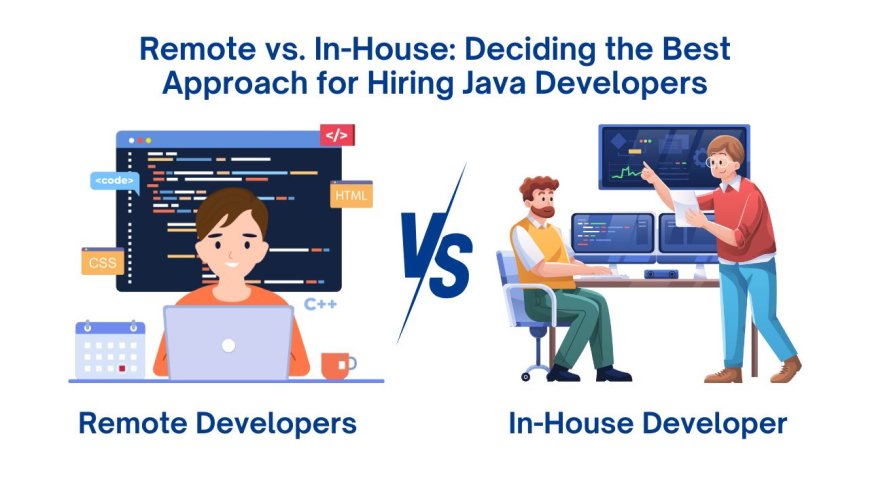Remote vs. In-House: Deciding the Best Approach for Hiring Java Developers
Discover the best approach for hiring Java developers—remote or in-house. Compare benefits, challenges, and key factors to make an informed decision for your team.

The debate over whether to hire Java developers remotely or in-house is ongoing. Each approach has its advantages and challenges, and the decision largely depends on the specific needs and circumstances of your business. This article will explore the key factors to consider when deciding between hiring remote Java developers or building an in-house team. We'll also discuss how to effectively leverage each option to achieve your business goals.
Understanding the Basics: Remote vs. In-House
Before diving into the pros and cons, it’s essential to define what we mean by "remote" and "in-house" hiring:
-
Remote Hiring: Involves hiring Java developers who work from a location outside your office. These developers could be freelancers, contractors, or part of an outsourcing company that provides development services.
-
In-House Hiring: Involves hiring Java developers who work on-site at your office. These developers are typically full-time employees who are part of your internal team.
Pros and Cons of Hiring Remote Java Developers
Pros of Remote Hiring
-
Access to a Global Talent Pool: Remote hiring allows you to tap into a vast global talent pool. You’re not limited to developers within commuting distance of your office, which means you can hire the best talent from around the world. This is particularly important when looking for specialized skills that may be scarce locally.
-
Cost Efficiency: Hiring remote developers can be more cost-effective than building an in-house team. You can save on office space, utilities, and other overhead costs. Additionally, depending on the location of your remote developers, you might benefit from lower salary expectations compared to local talent.
-
Scalability: Remote teams are easier to scale up or down based on project requirements. Whether you need additional resources for a short-term project or want to expand your team for a long-term initiative, remote hiring offers flexibility that in-house hiring cannot.
-
Round-the-Clock Productivity: With a distributed remote team, you can benefit from round-the-clock productivity. Developers working in different time zones can continue work even after your local team has finished for the day, potentially speeding up project timelines.
Cons of Remote Hiring
-
Communication Challenges: Time zone differences, language barriers, and cultural differences can lead to communication challenges. Ensuring everyone is on the same page requires additional effort in setting up clear communication channels and regular check-ins.
-
Management and Oversight: Managing a remote team can be more complex than managing an in-house team. It requires strong project management skills and tools to keep track of progress and ensure that remote developers are meeting deadlines.
-
Security Concerns: When working with remote developers, especially those from outsourcing companies, there may be concerns about data security and intellectual property protection. Ensuring that proper security measures and agreements are in place is crucial.
-
Building a Company Culture: It can be challenging to foster a strong company culture with a remote team. In-house teams benefit from face-to-face interactions and shared experiences, which can be difficult to replicate in a remote setting.
Pros and Cons of Hiring In-House Java Developers
Pros of In-House Hiring
-
Direct Communication and Collaboration: In-house teams benefit from direct communication and collaboration. Face-to-face meetings, spontaneous brainstorming sessions, and real-time feedback are easier to manage in an office environment.
-
Stronger Team Cohesion: In-house developers are more likely to feel a sense of belonging and loyalty to the company. They can easily participate in team-building activities, contributing to a stronger, more cohesive team.
-
Easier Management: Managing an in-house team is generally easier because you can directly oversee their work. There’s no need to rely on project management tools as heavily as with remote teams, and you can quickly address any issues that arise.
-
Security and Control: With an in-house team, you have greater control over your data and intellectual property. Security measures can be more easily implemented and monitored in a physical office setting.
Cons of In-House Hiring
-
Higher Costs: Building and maintaining an in-house team is often more expensive than hiring remotely. You’ll need to budget for salaries, benefits, office space, equipment, and other overhead costs.
-
Limited Talent Pool: Depending on your location, the local talent pool may be limited. This could result in longer hiring times and higher salaries to attract top talent.
-
Less Flexibility: Scaling an in-house team up or down can be more challenging than with a remote team. Hiring new employees or letting them go involves more administrative work and can have a greater impact on team morale.
-
Geographic Constraints: Your in-house team is limited by geographic constraints. Developers may need to commute, which can affect work-life balance and productivity.
Factors to Consider When Deciding Between Remote and In-House Hiring
When deciding whether to hire Java developers remotely or in-house, consider the following factors:
-
Project Scope and Timeline: If your project requires a quick turnaround, a remote team may be able to work around the clock to meet tight deadlines. However, for projects that require close collaboration and frequent communication, an in-house team might be more effective.
-
Budget: Your budget will play a significant role in your decision. If cost is a primary concern, outsourcing Java development to a remote team might be the more economical choice.
-
Company Culture: If maintaining a strong company culture is important to you, an in-house team may be preferable. However, with the right tools and practices, it is possible to build a positive culture with a remote team.
-
Talent Availability: Consider the availability of skilled Java developers in your area. If you’re struggling to find qualified candidates locally, hiring remotely may give you access to the talent you need.
-
Security Requirements: If your project involves sensitive data or proprietary technology, you may prefer to keep development in-house where you can maintain tighter control over security.
Case Study: Successful Implementation of Remote and In-House Java Teams
Example 1: Remote Team Success A fintech startup needed to develop a complex Java-based application within a tight deadline. The company opted to hire a remote team from an outsourcing Java development company. By leveraging a global talent pool, they assembled a team of experienced developers who worked in shifts around the clock. The project was completed ahead of schedule and within budget, demonstrating the effectiveness of remote hiring for time-sensitive projects.
Example 2: In-House Team Success A large enterprise sought to develop a long-term Java application with high security and regulatory compliance requirements. They chose to build an in-house team to maintain close oversight and ensure that all security protocols were followed. The in-house team benefited from direct communication and collaboration, resulting in a secure, high-quality product that met all industry standards.
Conclusion: Choosing the Right Approach for Your Business
The decision to hire Java developers remotely or in-house depends on your business’s unique needs and circumstances. Remote teams offer cost efficiency, flexibility, and access to global talent, making them ideal for projects with tight budgets or timelines. In-house teams provide better communication, stronger team cohesion, and greater control over security, making them suitable for long-term projects with specific requirements.
Ultimately, the right approach will depend on factors such as your project scope, budget, company culture, and security needs. By carefully weighing the pros and cons of each option, you can make an informed decision that aligns with your business goals and maximizes the success of your development projects.
FAQs
Q1. What are the benefits of hiring remote Java developers?
Remote Java developers provide access to a global talent pool, cost efficiency, scalability, and round-the-clock productivity.
Q2. What challenges might I face with a remote Java development team?
Challenges include communication barriers, management complexity, security concerns, and difficulties in building a company culture.
Q3. When is it better to hire in-house Java developers?
In-house developers are better for projects requiring direct communication, team cohesion, easier management, and higher security.
Q4. How do I decide between remote and in-house hiring?
Consider project scope, budget, company culture, talent availability, and security requirements when deciding between remote and in-house hiring.
Q5. Can I combine remote and in-house Java developers?
Yes, many companies use a hybrid approach, combining remote and in-house teams to leverage the benefits of both models.
What's Your Reaction?















![Noots Focus Reviews [Truth Exposed 2025]!](https://news.bangboxonline.com/uploads/images/202501/image_430x256_678e3b94881a1.jpg)
![Vivalis Male Enhancement: The Must-Know Ingredients [2025 Update]](https://news.bangboxonline.com/uploads/images/202501/image_430x256_678e3b54e396c.jpg)










